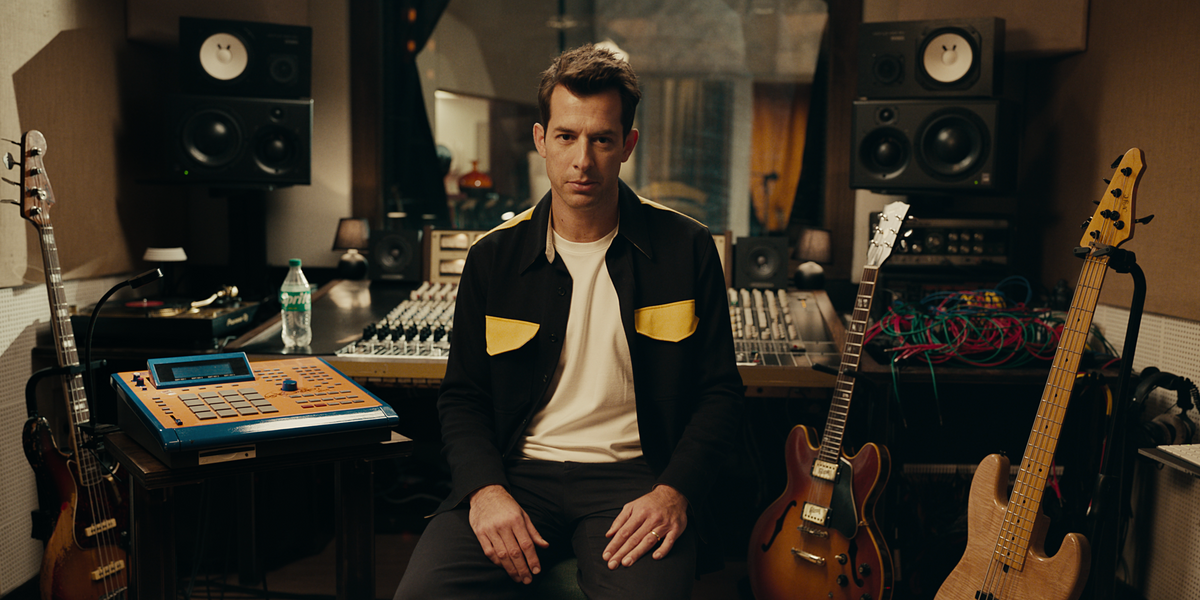
“I'd love to be Stevie Wonder or John Lennon and walk into a room with just a piano and make music,” Mark Ronson tells me over a Zoom call, laughing wistfully at the theoretical straightforwardness of composition-via-instrument ease. “Whether it was chopping up drum sounds or music," Ronson elaborates, "all my stuff, in the beginning, was completely sample-based."
While Mark Ronson may not be a concert pianist creating his hit tracks by stroking a few ivory keys, he is one of the most celebrated record producers of the 21st century — mixing, songwriting and producing songs with music legends like Amy Winehouse, Miley Cyrus, Bruno Mars and Lady Gaga. Taking inspiration from '90s boom-bap hip hop, Ronson began sampling from old jazz mixes and creating his own beats in the early 2000s for rappers like Ghostface Killah, Mos Def, Q-Tip and Nate Dogg.

Ronson always starts out with a soundbite to sample. "It could be like Amy Winehouse coming to my studio and playing me a bunch of old ’60s girl groups and being like, 'I want to make something that sounds like that,'" Ronson says. "Or looking for records with Lily Allen in a record store when we were making our first album and being like, 'Do you like this? Do you like this? Let's take this back to the studio and work on it.'"
“The first solo record I ever had was a song called 'Ooh Wee' with Ghostface and Nate Dogg,” Ronson tells me. “I was watching the movie Boogie Nights and there's a scene in a roller disco in the beginning with this incredible string sample," he says. "Obviously, this was like a century before Shazam," he adds, laughing. Thus began the chase to find these unforgettable and haunting disco strings.
Ronson eventually found the strings in Boney M’s cover of "Sunny." The song, which he chopped and mixed, soon became part of his first single, “Ooh Wee.” After singing the jazzy chorus over our Zoom call — “Sunny! Yesterday my life was filled with rain" — he explains that, because the sample is a jazz standard, the artists requested 100% of the publishing income. Then the creator of the drum sample asked for 25%. “It's always on the radio and licensed for some commercial or some movie," Ronson says, shaking his head. "I think I make literally minus 25% every time that song is played.”

Mark Ronson's love for hunting, mixing and transforming soundbites into new musical entities has inspired a new partnership with The Coca-Cola Company and fellow producer Madlib to tackle a bold musical experiment that takes sounds from Coca-Cola's recycling plant to create "Recycled Records," an original EP of "recycled" sounds.
"When I got the sounds," Ronson says, describing the swooshing and popping sounds from Coke's bottling plant (crushing bottles, crackling plastic and bales of recycled material being hauled from the docks), "the first thing that came into my mind was late 90s New York boom-bap hip hop... the stuff that made me want to make music."
"Producers like DJ Premier, Q-Tip, Tribe, all that music is so heavily sample-based," Ronson explains, "so the first track that I did [for the Recycled Records EP] sounds like an ode to some of my heroes: '90s boom-bap hip hop," he tells me.

Ronson describes two schools of sampling: finding an awesome loop (think Q-Tip's "Vivrant Thing" sampling the groovy beat from Love Unlimited Orchestra's "I Wanna Say") and finding the "tiniest little milliseconds of music things and chopping them up and reprogramming them" (like DJ Premiere's beat for Biggie Smalls' "Ten Crack Commandments" which cleverly chopped up Les McCann's "Vallarta").
"DJ Premier told me this amazing story about Biggie," he says, eyes widening. "Biggie came up to him and was like, 'I'm finishing my album, I have to get that joint from you.'" Premier was known for having the best hardcore underground song on everybody's album, Ronson explains. "So Premier was like 'Man, I'd love to but, I don't have time.' And Biggie was like 'Man, I don't know, hook up the 'Impeach the President' drums and just play some noises over it or something.'" And that's exactly what DJ Premier did. "'Unbelievable' by Biggie is just those drums chopped up with Premier going ba boom bom bom, almost the equivalent of abstract expressionism in hip hop."
“There’s a banger inside you desperate to get out,” Ronson tells me. "And that's the beauty of sampling, you can give anybody a sound palette and everyone will interpret it in a different way."
With this new campaign, fans will not only be able to listen to the one-of-a-kind tracks from Mark Ronson, but they’ll also have the ability to remix the very same sounds he used to create their own original compositions via an interactive digital beat machine hosted on cokeurl.com/greentoclear.
"It's always terrifying, because you're like, 'Oh my God, some 17-year-old kid in his bedroom in Iowa is gonna make something so much better than what I did,'" Ronson says. "But that's also the beauty of the whole project."
Check out the sonic exploration of recycled sound in The Coca-Cola Company, Madlib and Mark Ronson's Recycled Records campaign below.
Photos courtesy of The Coca-Cola Company
From Your Site Articles
- Mark Ronson Says He's Sapiosexual ›
- Mark Ronson's New Album Looks Legendary ›
- Mark Ronson’s New Album Is a Lovelorn Disco ›
Related Articles Around the Web